Panel Series: Christian Nationalism and the 2024 Election
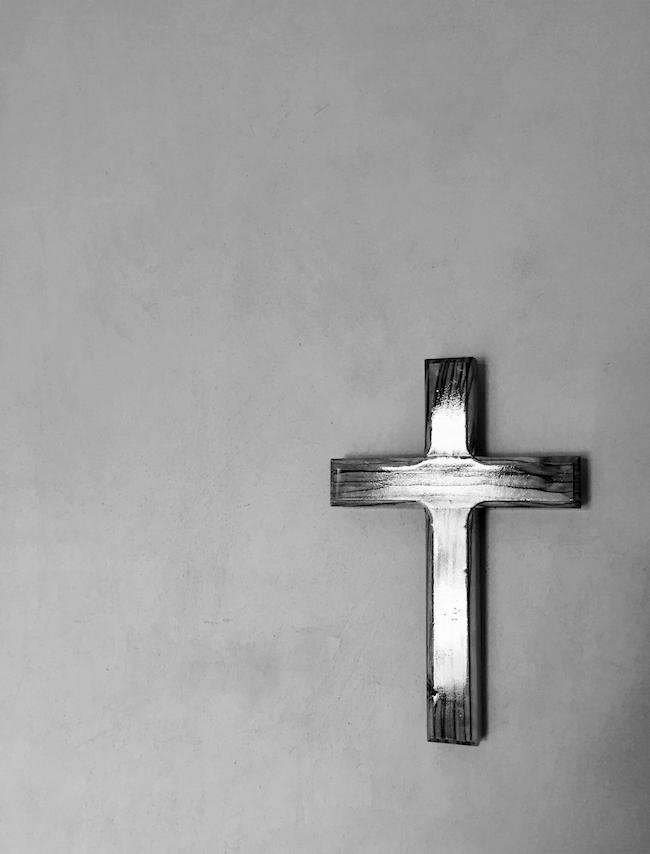
Date: Tuesday, October 29, 2024
Time: 3:00 - 6pm
Location: Corcoran Commons, Heights Room
3:00 - 4:15pm: “Christian Nationalist Traditions” Mark Silk, moderator. Nancy Ammerman, Cheryl Townsend Gilkes, M. Cathleen Kaveny, and Sarah Riccardi-Swartz
4:15 - 4:45pm: break (coffee/drinks and light refreshments)
4:45 - 6:00pm: “The State of Play Today” Rhys Williams, moderator. Ruth Braunstein, Evan Stewart, Aaron Weinstein, and Jack Delehanty
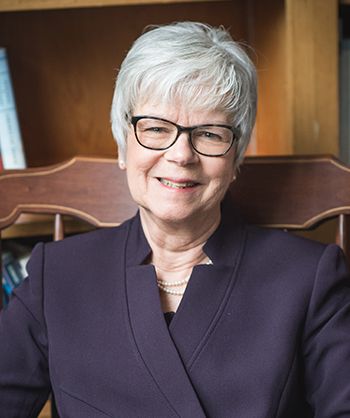
Nancy T. Ammerman is professor emerita at Boston University School of Theology, where she served as professor of sociology of religion (2003-2019), after having previously taught at Emory University’s Candler School of Theology (1984-95), and at Hartford Seminary’s Hartford Institute for Religion Research (1995-2003). At Boston University, she also served the College of Arts and Sciences as associate dean of the faculty for the social sciences (2015-18), as chair of the department of sociology (2007-13), and director of the graduate division of religious studies (2014-15). Ammerman’s earliest work explored grassroots Fundamentalists and analyzed the organizational architecture of the 1980s conservative takeover of the Southern Baptist Convention. Her most recent research has focused on everyday lived religion across a wide religious and geographic spectrum, including working with Grace Davie (University of Exeter) to coordinate an international team of scholars to assess “Religions and Social Progress” for the International Panel on Social Progress.
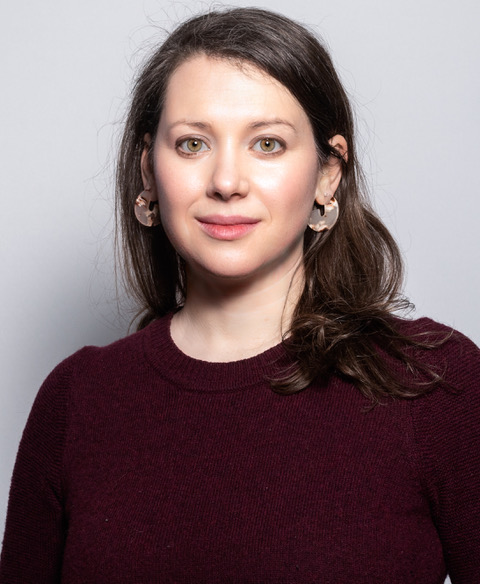
Ruth Braunstein is associate professor of Sociology at the University of Connecticut, where she is director of Undergraduate Studies and director of the Meanings of Democracy Lab. A cultural sociologist interested in the role of religion and morality in American political life, Braunstein's award-winning research has been published in the top peer-reviewed journals in her field, and has been covered in major news outlets including the New York Times, Washington Post, and Time Magazine. She also writes frequently for public audiences, including at The Guardian, Religion News Service, and The Conversation.
Her forthcoming book, My Tax Dollars: The Morality of Taxpaying in America (Princeton University Press), examines how the mundane act of taxpaying can, under certain circumstances, become infused with intense moral significance -- sometimes positive, sometimes negative -- with major implications for American politics and institutions. This project is supported by grants from the Louisville Institute, the Society for the Scientific Study of Religion (SSSR), the Swarthmore College Peace Collection, and the University of Connecticut.
.jpg)
Jack Delehanty is an associate professor of sociology at Clark University. His research addresses how religion and moral thinking contour American civic life and politics. His recent book, Making Moral Citizens, explains how community organizers bring people together across race, class, and religious lines to build collective political power. Delehanty has also studied how religion can animate conservative politics and fuel discriminatory attitudes.
.jpg)
Cheryl Townsend Gilkes is the John D. and Catherine T. MacArthur Professor Emerita of African-American Studies and Sociology at Colby College (Waterville, Maine). An ordained Baptist minister, she is an assistant pastor for special projects at the Union Baptist Church in Cambridge, Massachusetts. She has served as visiting faculty at several seminaries and schools of divinity, most recently Chicago Theological Seminary and Yale University. She also serves as a Distinguished Professor, Community Liaison, and Research Consultant for the Hartford International University for Religion and Peace (formerly Hartford Seminary). She holds degrees in sociology from Northeastern University (B.A., M.A., Ph.D.), has pursued graduate theological studies at Boston University's School of Theology, and has received an honorary Doctor of Divinity (D. D.) from Ursinus College. In addition to her book, If It Wasn't for the Women: Black Women's Experience and Womanist Culture in Church and Community, she has published articles in scholarly journals and edited volumes on race and ethnicity, the work of W.E.B. Du Bois, and African American religion. She has also published sermons in several journals and edited volumes. Until the pandemic, she was "Dr. Dr. Cheryl" on Colby College's radio station where she hosted a gospel music radio show, "The Uncloudy Day," for 19 years. Since the pandemic, she has contributed several opinion pieces to Religion News Service and has written the introduction to the fiftieth anniversary publication of James Cone’s book, The Spirituals and the Blues: An Interpretation.
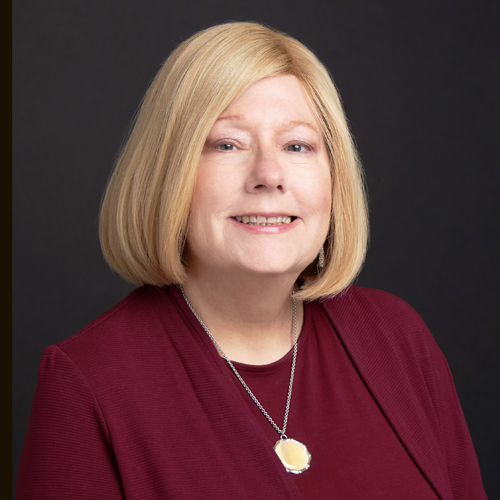
M. Cathleen Kaveny is a scholar who focuses on the relationship of law, religion, and morality, serves as the Darald and Juliet Libby Professor at Boston College, a position that includes appointments in both the department of theology and the law school. She is the first faculty member to hold such a joint appointment. A member of the Massachusetts Bar, Kaveny clerked for the Honorable John T. Noonan Jr. of the U.S. Court of Appeals for the Ninth Circuit and worked as an associate at the Boston law firm of Ropes & Gray in its health law group. She was the 2018-2019 Cary and Ann Maguire Chair in Ethics and American History at the Kluge Center of the Library of Congress. Kaveny has published four books and over a hundred articles and essays, in journals and books specializing in law, ethics, and medical ethics. She serves on the masthead of Commonweal as a regular columnist. Her books include Law’s Virtues: Fostering Autonomy and Solidarity in American Society (Georgetown University Press, 2012); A Culture of Engagement: Law, Religion, and Morality (Georgetown University Press, 2016); Prophecy without Contempt: Religious Discourse in the Public Square (Harvard University Press, 2016); and Ethics at the Edges of Law: Christian Moralists and American Legal Thought (Oxford University Press, 2018). Kaveny regularly teaches contract law to first-year law students. She also teaches a number of seminars which explore the relationship between theology, philosophy, and law, such as “Faith, Morality, and Law,” “Mercy and Justice,” and “Complicity.” Kaveny is the chair of the board of trustees of the Journal of Religious Ethics. She has been the president of the Society of Christian Ethics, the major professional society for scholars of Christian ethics and moral theology in North America. It meets annually in conjunction with the Society of Jewish Ethics and the Society for the Study of Muslim Ethics. Kaveny has served on a number of editorial boards including The American Journal of Jurisprudence, The Journal of Religious Ethics, the Journal of Law and Religion, and The Journal of the Society of Christian Ethics. She has been a visiting professor at Princeton University, Yale University, and Georgetown University, and a visiting scholar at the University of Chicago’s Martin Marty Center. From 1995 until 2013 she taught law and theology at the University of Notre Dame, where she was a John P. Murphy Foundation Professor of Law.
.jpg)
Sarah Riccardi-Swartz is an assistant professor of religion and anthropology at Northeastern University, where she is also an affiliate faculty member in the Women’s, Gender, and Sexuality Studies Program. Her research focuses on conservative politics, race, media worlds, gender and sexuality, and Orthodox Christianity. She is the author of Between Heaven and Russia: Religious Conversion and Political Authority in Appalachia (Fordham University Press, 2022). She produced and directed Pixelating Holiness, a short documentary film which screened at the Margaret Mead Film Festival in 2018. Beyond academic work, she has appeared on numerous podcasts and has written for The Immanent Frame, The Conversation, Canopy Forum, and Religion Dispatches. Her work on religion and politics in the United States has been supported by the Social Science Research Council, National Endowment for the Humanities, the Institute for Citizens and Scholars (formerly the Woodrow Wilson Foundation), the Fetzer Institute, and the Louisville Institute, among others.
.jpg)
Mark Silk is Professor of Religion in Public Life Emeritus at Trinity College, from which he retired in June 2023. After receiving his Ph.D. in history from Harvard University, he edited the Boston Review and spent 10 years as a reporter, editorial writer, and columnist for the Atlanta Journal-Constitution. In 1996 he became the founding director of the Leonard E. Greenberg Center for the Study of Religion in Public Life as well as a faculty member at Trinity College. He is the author of Spiritual Politics: Religion and America Since World War II, Unsecular Media: Making News of Religion in America, and (with Andrew Walsh) One Nation, Divisible: How Regional Religious Differences Shape American Politics. He has co-edited two book series, Religion by Region (8 vols.) and The Future of Religion in America (5 vols.). Currently he is a contributing editor and weekly columnist for the Religion News Service and a visiting scholar at the Boisi Center for Religion and American Public Life at Boston College.
.jpg)
Evan Stewart is an assistant professor of sociology at University of Massachusetts Boston. His research centers on a variety of topics focused on the stakes of pluralism in social life: what brings diverse groups of people together and what breaks them apart? This work currently focuses on climate inequality, religious pluralism, and belonging in public life. This work has appeared in American Sociological Review, Social Forces, Social Problems, and Sociological Theory, among other outlets. Stewart is also an associate editor at the journal Sociology of Religion. Public sociology is an important part of his scholarly work. He was a 2021-2022 fellow with the Public Religion Research Institute and the editor and principal author at Sociological Images - one of the largest sociology blogs in the country. Stewart's research has also been featured on media outlets including WBUR Boston, The Conversation, Washington Post’s Monkey Cage, and FiveThirtyEight. Stewart earned a Ph.D. in Sociology from the University of Minnesota, where he worked as an Edelstein Fellow with the American Mosaic Project and an Interdisciplinary Doctoral Fellow with the Center for the Study of Political Psychology. He also holds an M.A. in Sociology from UMN and a B.A. in Political Theory and Social Policy from Michigan State University’s James Madison College.
.jpg)
Dr. Aaron Q. Weinstein is an assistant professor in the Department of Politics at Fairfield University. He specializes in American political thought, with a particular emphasis upon the American Civil Religion (ACR). His research has appeared in numerous peer-reviewed scholarly outlets, including Politics, Religion & Ideology; American Political Thought; and New Political Science, among others.
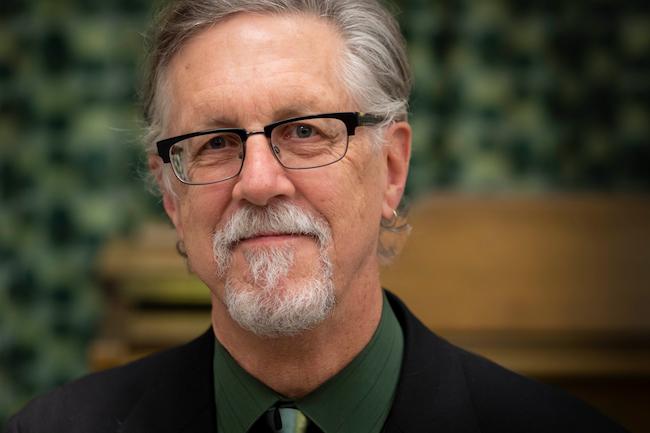
Rhys H. Williams (Ph.D., University of Massachusetts, 1988) is professor emeritus of Sociology at Loyola University Chicago. His research interests focus on religion in American politics and culture, including recent attention to the politics of immigration in public discourse and attitudes. His books include A Bridging of Faiths: Religion and Politics in a New England City (Princeton 1992; w/ N.J. Demerath III), Cultural Wars in American Politics (Aldine 1997), Religion & Progressive Activism (New York University Press, w/ Ruth Braunstein and Todd Fuist), and Civil Religion Today: Religion and the American Nation in the 21st Century (NYU Press, w/ Ray Haberski and Philip Goff). Williams’ articles have appeared in the American Sociological Review, Social Problems, Sociological Theory, Theory & Society, Sociology of Religion, and the Journal for the Scientific Study of Religion, among others.
"A Christian Nation? Understanding the Threat of Christian Nationalism to American Democracy and Culture." PRRI. Public Religion Research Institute, February 8, 2023.
Gorski, Philip P., and Samuel L. Perry. The Flag and the Cross. Oxford: Oxford University Press, 2022.
Jones, Robert P. "The Roots of Christian Nationalism Go Back Further Than You Think." TIME, August 31, 2023.
Perry, Samuel L., Ruth Braunstein, Philip S. Gorski, and Joshua B. Grubbs. "Historical Fundamentalism? Christian Nationalism and Ignorance About Religion in American Political History." Journal for the Scientific Study of Religion 61, no. 1 (2021).
Straughn, Jeremy Brooke, and Scott L. Feld. “America as a ‘Christian Nation’? Understanding Religious Boundaries of National Identity in the United States.” Sociology of Religion 71, no. 3 (2010): 280–306.
Tyler, Amanda. How to End Christian Nationalism. Minneapolis, MN: Broadleaf Books, 2024.
As the 2024 election draws near, many media outlets are covering controversies involving voting and ideological extremism. A recently published article from NPR focuses on a Christian nationalist movement to recruit election workers. The “Courage Tour” hosts influential speakers like Lance Wallnau while holding worship in large event spaces. The main goals of this program are to give people courage to speak about their political opinions and encourage them to work at polls and election centers. Much of the language used by members of the Courage Tour involves religious elements. For example, they name the election as, “a literal spiritual between angels and demons.” The article also refers to the environment of election workers. Heavy scrutiny and intense attention to detail naturally results in a lack of trust, but workers still tend to view elections as secure regardless of political affiliation. Although many unknowns about the election clearly still remain, an esteemed panel will discuss these themes and piece together different Christian nationalist traditions to gain a larger perspective of the matter at hand.
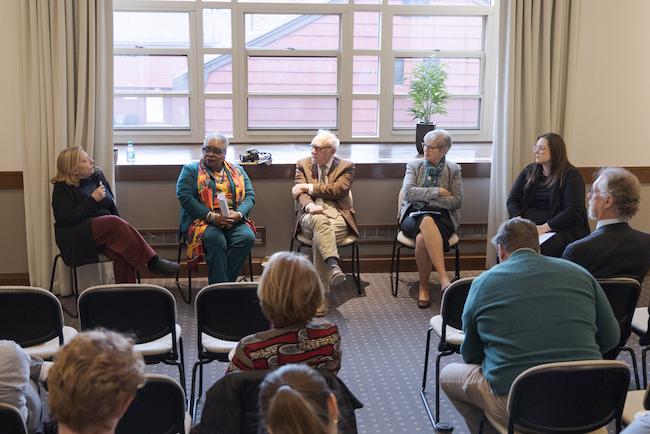
Panel one: “Christian Nationalist Traditions” from L to R: M. Cathleen Kaveny, Cheryl Townsend Gilkes, Mark Silk, Nancy Ammerman, and Sarah Riccardi-Swartz.
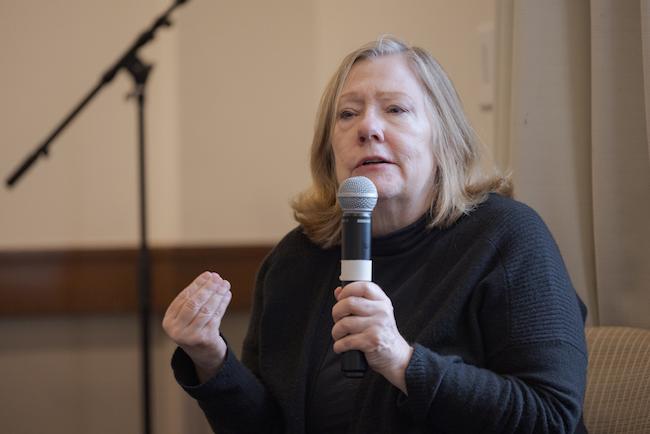
M. Cathleen Kaveny serves as the Darald and Juliet Libby Professor at Boston College, a position that includes appointments in both the department of theology and the law school.
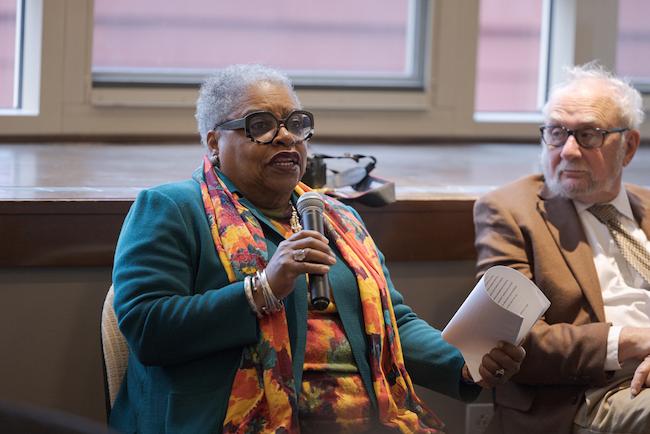
Cheryl Townsend Gilkes is the John D. and Catherine T. MacArthur Professor Emerita of African-American Studies and Sociology at Colby College (Waterville, Maine).
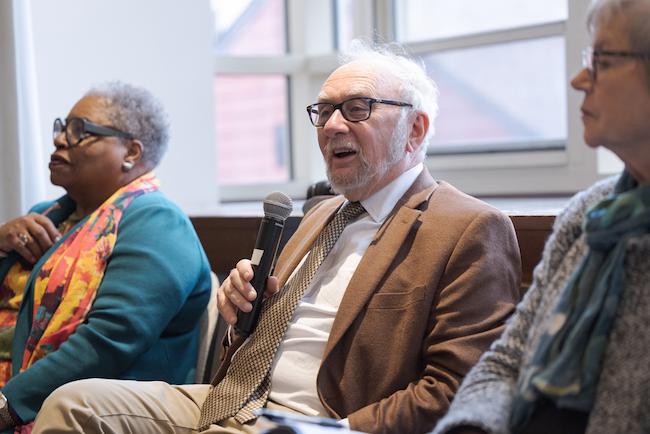
Mark Silk (center), emeritus professor of Religion in Public Life at Trinity College Hartford, moderated the panel.
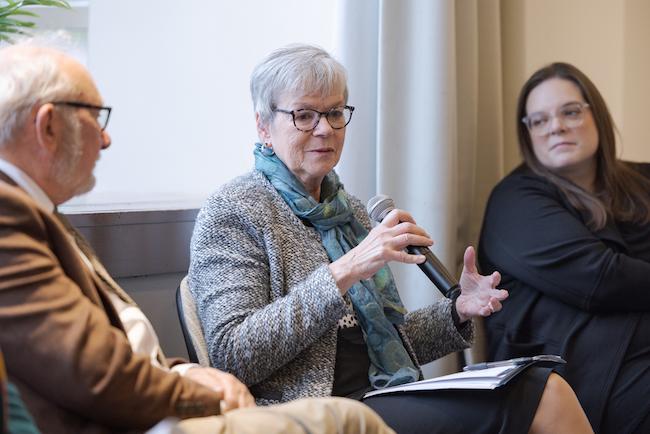
Nancy T. Ammerman (center) is professor emerita at Boston University School of Theology.
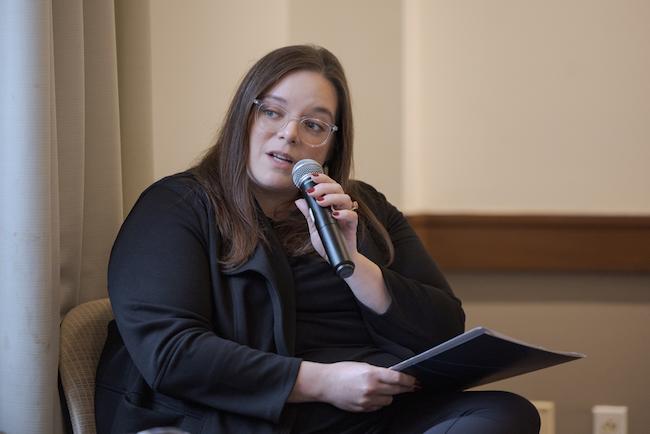
Sarah Riccardi-Swartz is an assistant professor of religion and anthropology at Northeastern University, where she is also an affiliate faculty member in the Women’s, Gender, and Sexuality Studies Program.
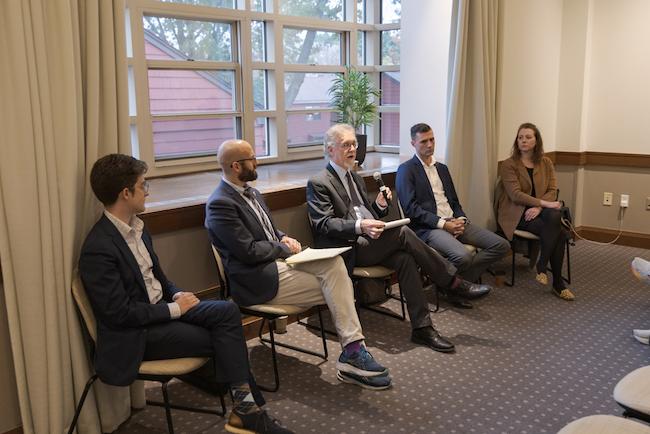
Panel two: “The State of Play Today”(from L to R): Evan Stewart, Aaron Weinstein, Rhys Williams, Jack Delehanty, and Ruth Braunstein.
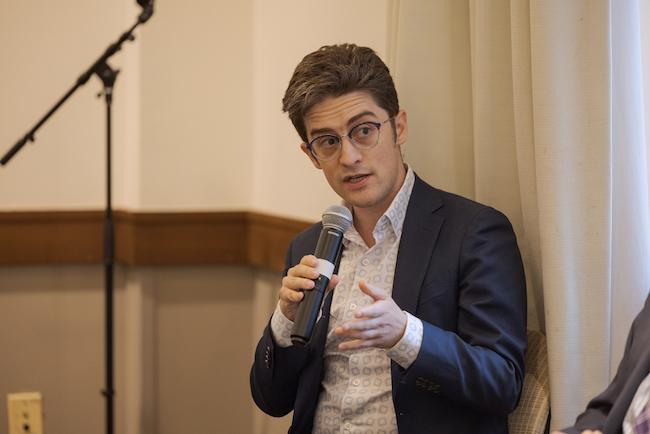
Evan Stewart is an assistant professor of sociology at University of Massachusetts Boston.

Aaron Q. Weinstein is an assistant professor in the department of politics at Fairfield University.
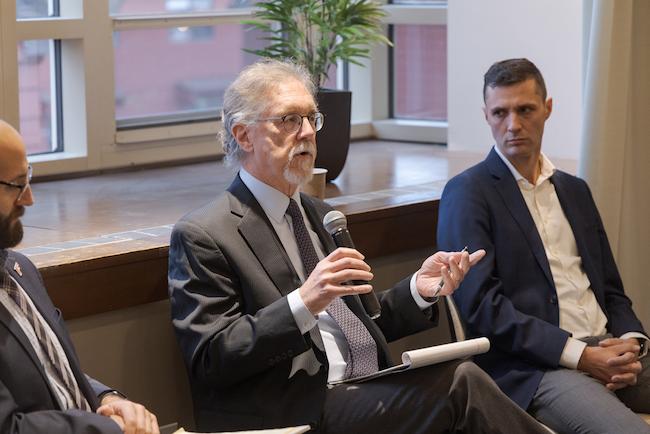
Rhys H. Williams (center) is professor emeritus of sociology at Loyola University Chicago.
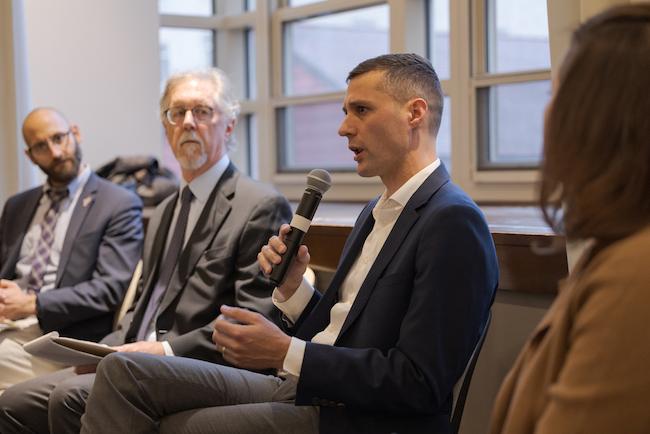
Jack Delehanty (holding microphone) is an associate professor of sociology at Clark University.
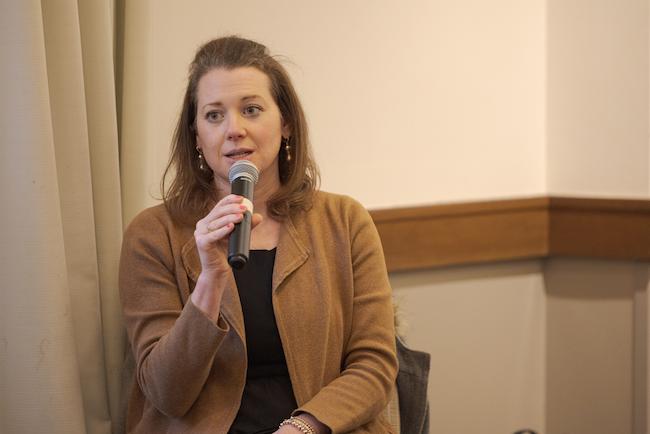
Ruth Braunstein is associate professor of sociology at the University of Connecticut.
On October 29th, 2024, the Boisi Center hosted a panel series entitled, “Christian Nationalism and the 2024 Election.” The event was comprised of two panels. Mark Silk, an emeritus professor of religion and public life at Trinity College Hartford, moderated the first panel on Christian Nationalist traditions. The panel members included Nancy Ammerman, a professor emerita at Boston University’s School of Theology; Cheryl Townsend Gilkes, the John D. and Catherine T. MacArthur Professor Emerita in African-American studies and sociology at Colby College as well as an ordained Baptist minister; M. Cathleen Kaveny, serves as the Darald and Juliet Libby Professor with appointments in both the Law School and theology department at Boston College; and Sarah Riccardi-Swartz, an assistant professor of religion and anthropology at Northeastern University.
Silk’s questions were tailored to each panelist. He asked about topics like the rise and evolution of Christian nationalism as it relates to the Southern Baptist Convention, conservative Catholics, Black Christians, and international Christian nationalist groups. Ammerman, an expert on the Southern Baptist Convention, tied the growth of Christian nationalists in that denomination to the influence of community leaders and race relations. She also noted that only some members of the Southern Baptist Convention support Christian nationalism, with many more staying within the boundaries of historic Baptist teachings. Silk engaged Kaveny around the role of Catholics in the Christian nationalist movement. Similar to what Ammerman observed about Baptists, Kaveny noted that Christian nationalism is not a widespread school of thought amongst Catholics in the United States. However, where it does emerge, it is often connected to concern with only one major ethical issue (e.g. abortion). Townsend Gilkes discussed the nuances of Black Christian support for aspects of Christian nationalism. She noted that the movement among Black Christians is distinct, as it does not often condone the violence associated with mainstream Christian nationalism. Riccardi-Swartz talked about the international movements of Christian nationalism and in particular, Putin's embrace of nationalist sentiments. She noted how Putin has positioned himself as an ally for Christian nationalists in the United States who are opposed to American liberalization. Overall, the panel illuminated the multifaceted nature and influence of Christian nationalism in the United States.
The second panel, led by moderator Rhys Williams, focused on the contemporary relationship between religion and political ideology. The speakers on this panel were Ruth Braunstein, associate professor of sociology and director of the Meanings of Democracy Lab at the University of Connecticut; Jack Delehanty, associate professor of sociology at Clark University; Evan Stewart, assistant professor of sociology at the University of Massachusetts Boston; and Aaron Weinstein, assistant professor of politics at Fairfield University. Their combined knowledge resulted in a fruitful conversation about trends in religious and political affiliation among Americans. Braunstein engaged with questions about proto-MAGA movements such as the Tea Party Movement and related it to the current state of American politics. On the other end of the political spectrum, Delehanty contrasted these movements by discussing the role progressive grassroots movements or “faith-based organizing” plays in the realm of political activism from a religious perspective. Weinstein looked at these two sides and related them to the highest office in the country. He pondered the difference in approaches to religion between presidents like Joe Biden and Barack Obama, who embrace civil religion, and presidents like Donald Trump, who embrace political religion. Stewart weaved all of these ideas together through his expertise in survey data. By looking at recent research, he analyzed the trends in attitudes toward different ideologies related to religion and the state. This impressive cast of panelists interacted with each other in a very nuanced manner that sparked even more discussion after their own conversation had concluded.

